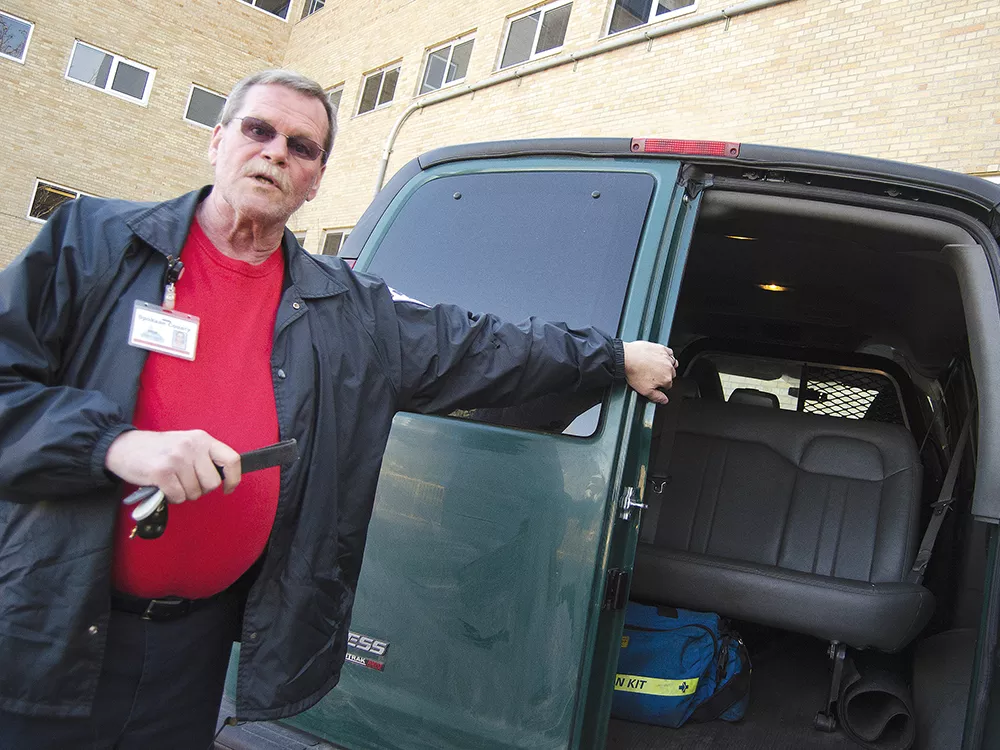
Discreet save for an orange light bar across the roof, the green passenger van patrols the dark streets of downtown Spokane. As the van pulls into a gas station parking lot on a recent Friday, a large woman in a hooded jacket flashes a drunken grin and waves her arms wildly.
“Hey!” she shouts, rushing up to the driver-side window. “We missed you, Barry!”
Behind the wheel, Barry asks the woman how she has been. She beams a gap-toothed smile. She’s doing good, she slurs. He will be proud. She bets him she blows less than a .2 percent blood alcohol level on the breathalyzer.
Her skinny companion smokes a cigarette nearby, shuffling his feet on the pavement. He calls into the darkness.
“We’re going to the sobering unit!” he yells across the lot. “You coming?”
Another man staggers out of the shadows. He looks around, eyes narrowed. He drags a grimy backpack. All three wobble as they walk. They smell of alcohol and speak with a slippery rhythm.
For more than 30 years, the City of Spokane has contracted with local groups to operate a roving detox van, patrolling the city streets each night for wayward addicts and alcoholics. Once located, the intoxicated individuals can recover overnight in a sobering unit — like a jailhouse drunk tank, but voluntary.
Barry, who asked to be identified by first name only, has driven a van for Community Detox Services of Spokane for nearly three years. The nonprofit organization offers a variety of chemical dependency and support services, but they also run the city’s only patrolling detox van.
Proponents say the van program keeps endangered people off the streets without tying up expensive medical or law enforcement resources. With strong support from local emergency responders, the Spokane City Council voted last week to extend the detox van’s patrol hours and reserve an extra bed in the sobering unit for late weekend nights.
On the first night of the extended schedule, Barry prepares to work until 3 am. Latex gloves over his hands and a chirping police radio on his hip, he patiently helps all three of his new passengers into the green van, dispatched as “Car 50.” They slump comfortably into their seats.
“I don’t even know where I’m at right yet,” one admits.
Don’t worry, the woman answers with a laugh:
“This is the party van.”
Situated near the hospitals and doctor’s offices along Eighth Avenue on the lower South Hill, Community Detox Services of Spokane has contracted with the city for nearly 20 years. Executive Director Karen Bourget-Orosco says the detox service operates 10 chemical dependency treatment programs overall on an annual budget of approximately $1.5 million. The van service runs on about $145,000 a year.
“It certainly helps the fire department and the city at large,” Bourget-Orosco says of the van program. “We’re considered the safety net.”
Don Bissinger, who has 17 years as a driver and supervisor with the van service, says the program was created to close the gap between public intoxication and medical emergency. A drunk person out on the street does not always need expensive medical attention, but they do need a safe place to rest and recover.
Van drivers work closely with the Spokane Police Department and Spokane Fire Department to respond to “man down” calls involving a person collapsed or slumped in a public space. Each driver carries a police radio and fire pager. They must be able to respond within 10 minutes of a call.
If the person is found to be intoxicated, but otherwise medically sound, paramedics or police officers can pass the person off to the detox van for a ride to the sobering unit. Bissinger says the van responds to an average of 300 “man down” calls a month.
“We go down and pick ‘em up, bring ‘em up here,” Bissinger says. “We just try to get them out of the situation that they’re in at the time.”
By relieving medical crews from having to take the person to a hospital, the van program typically saves taxpayers about $600 for each avoided ambulance transport as well as a potential $2,000 emergency room bill.
Bissinger stresses that the van program is completely voluntary, but sometimes the choice is between the detox van or jail. People often choose the van to the sobering unit. He points to the caged wire around the van windows, saying some safety measures have to be taken against unruly passengers.
“We’re all normal people until we get some alcohol or drugs in us,” he says.
Once back at the sobering unit, a client can stay for about 12 hours. The program is staffed by emergency medical technicians who check blood pressure and vitals every two hours. The sobering unit patients can rest, rehydrate and get something to eat.
Staff can also refer guests to detox and chemical dependency programs located upstairs in the building. The service provides involuntary treatment programs, mental health therapy, veterans programs and youth therapy.
Bissinger says the van service racks up another 400 transports a month driving clients to and from chemical dependency appointments or taking people to local missions for help.
When not responding to specific calls, van drivers are expected to conduct “sweeps” of the downtown core, Bissinger says. They cruise through alleys and under the freeway looking for individuals in trouble.
“We know where these people hang out,” he says. “We know where they have their camps. We know where they hide in the bushes. … I know every little nook and cranny of the downtown area.”
Assistant Spokane Fire Chief Brian Schaeffer says the Emergency Services Patrol van serves as an innovative and cost-effective approach to taking care of alcoholics and addicts wandering the streets. Previous options included an expensive ambulance ride, putting them in a taxi or just leaving them there.
“It’s really an out-of-the-box solution to a growing problem,” Schaeffer says. “We’re busier now than we ever have been. It’s sort of ridiculous.”
Schaeffer recently wrote a recommendation to the City Council asking them to renew and expand the city’s contract with the van program for the next two years. The new contract extends weekend hours from midnight to 3 am on Friday, Saturday and Sunday. It also requires the sobering unit to hold an open bed for the fire department.
“It’s kind of a big deal,” Schaeffer says. “The additional hours is huge.”
The Spokane Fire Department has long supported the van program. The department licenses the van, certifies the EMTs on staff and tracks response times. Every transport that can be passed to the detox van frees up a fire engine or ambulance crew to handle other emergencies.
Schaeffer says a recent review of “man down” calls found significant increases in late-night hours. Fire crews still had to respond to calls after midnight and crews often had to decide whether to commit to a transport or leave the person where they were.
“It was putting the paramedics in a really bad spot,” he says. “It was adding up to a lot of ‘out of service’ time because they were trying to be a social worker.”
The new contract costs the city an extra $1,000 a month for the longer hours and spare bed. Officials say the van contract now costs about $8,300 a month, adding up to just under $100,000 a year.
Beyond saving money, Schaeffer argues the van program actually provides a proactive approach to helping people. The van independently searches the dark corners of the city, sometimes finding people sick and cold, in need of serious medical attention.
“They’ll be responsible for saving that person’s life just because they had the compassion to stop and check on them,” he says. “Bureaucratically, so often we get focused on numbers and transports and costs. This is one of those programs that’s compassionate. It demonstrates the social responsibility that I think we all have as people.”
Bissinger says many of the people the van drivers encounter on the street feel misunderstood. They’re not looking for sympathy, he says, but they are looking for a way to break the cycle of homelessness or addiction.
“We’re trying to offer something positive,” he says. “After all, they’re human beings too. Not any of us were born a drunk or an addict. … It’s somebody’s son, daughter, mom, dad, sister, brother. It’s somebody. They’re human beings with feelings. You’ve got to be empathetic.”
As Barry drives the streets on a recent Friday, he stops to talk to people he recognizes from detox, the hard-core alcoholics he calls “professionals.” He wonders if the new extended hours will mean picking up more “amateur” drunks, normal revelers who drink too hard one night and pass out on the street.
Rolling north toward the sobering unit, the large woman sits in back and explains how the program works to her companions. She says they can stay until about 8 am the next day. It will be warm. There will be food.
“It’s better than sleeping on the street,” she says.
Barry soon pulls into the detox center parking lot. All three passengers must take a breathalyzer test before they can be admitted. The woman brags when she does in fact blow lower than a .2 percent blood alcohol level.
“Told you,” she says.
Under a streetlight, Barry helps them unload their bags. They light cigarettes as Barry heads inside to start their intake forms. In the evening quiet, it’s a short break for everyone, a chance to rest before going back out on the dark streets.
“You guys come on in when you’re ready,” he says.

















